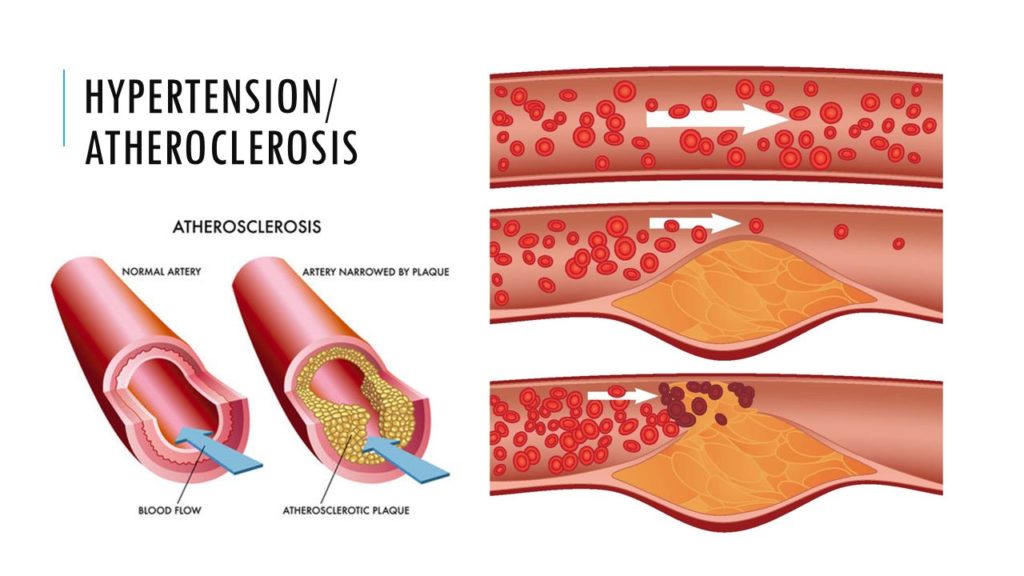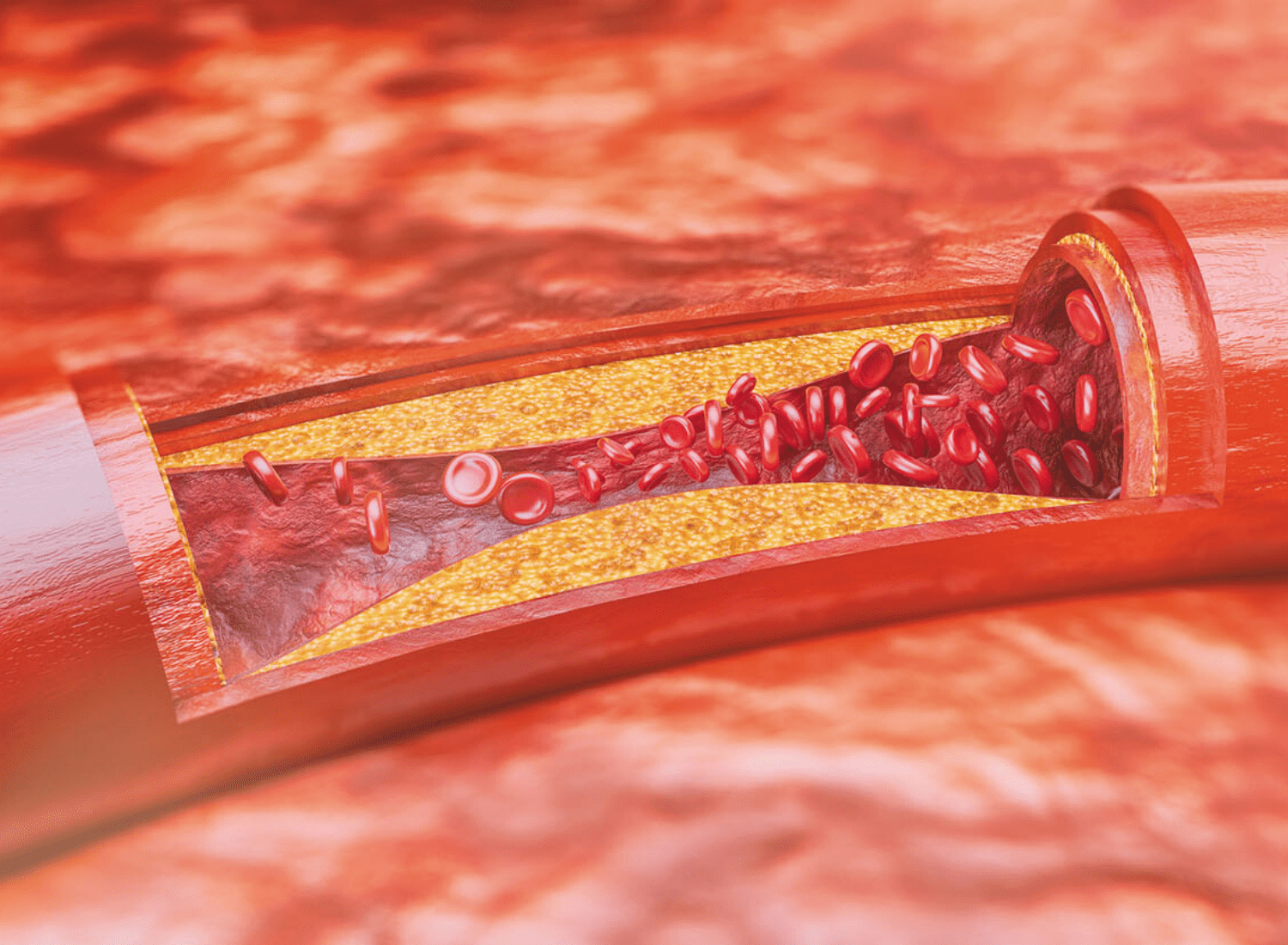
Atherosclerosis is the progressive degeneration of the arterial wall and accompanied by Hypertension. It usually starts in the 30s and won’t be dangerous until people reach their 50s or 60s.
In other words, atherosclerosis is the build-up of plaque or hardening of arteries. As you age, fatty substances deposits in an arterial wall and make it difficult for any organ to get enough amount of blood and oxygen supply.
Plaque may restrict the blood flow in large or medium-sized arteries in the heart, brain, kidneys, etc. and causes serious conditions such as
• Coronary artery disease: Plaque forums arteries leading to heart
• Angina: Chest pain as blocked blood flow in the heart muscle
• Carotid artery disease: blocked blood flow in nearby arteries supplying blood to the brain
• Peripheral artery: in peripheral organs mainly legs
• Chronic Kidney disease
How Hypertension affects atherosclerosis
When the heart beats, it constantly pushes the blood to the entire body.
As higher the BP, arteries get swelled and stretched than normal. This stretching may injure the inner wall of the arteries which is endothelium and make arteries harder and stiffer.
Injured endothelium allows more bad cholesterol and WBC to enter the lining of the artery and make the plaque.
Who is at risk of Atherosclerosis?
Plaque is dangerous. As it grows for years without symptoms, suddenly get ruptured, forming a blood clot which blocks the artery and preventing oxygen supply to heart and brain results in heart attack and stroke respectively.
Plaque build-up in arteries restrict the blood flow and preventing organs and tissues getting oxygenated blood and do their work efficiently the way they should.
Following are the causes for hardening of the arteries
• High Cholesterol
This is the yellow, waxy substance found naturally in the body and also in the food we eat. When there is an increased level of cholesterol in the blood, it makes the plaque which forms inside the arteries and resists the blood flow.
Diet
Avoid consuming a high amount of sugar, salt, fat, sugar-sweetened beverages and should follow the healthy diet pattern including as below:
Include Fibre-rich fruits and vegetables
Increase the amount of Whole grains consumed
Include lean Fish and poultry products
Increasse Nuts and legumes
Prefer Low-fat Dairy Products.
Ageing
As you age, your blood vessels need to work harder for blood supply which loses its elasticity and make it more susceptible to plaque build-up.
But there are also some other factors which cannot be prevented.
Family History
If atherosclerosis runs in your family then you may be at higher risk.
Lack of Exercise
In addition to a healthy diet, exercise is also much needed for the heart to be healthy lifelong. Sedentary lifestyle put you at risk for various cardiac diseases.
Smoking
This is the potential cause of plaque formation as it accelerates the formation of the fatty deposits.
Diabetes
Diabetic people have much higher incidence of coronary artery disease.
Signs and Symptoms of Atherosclerosis
Usually, atherosclerosis won’t have symptoms until the artery is so narrowed or blocked that it cannot efficient blood supply.
Symptoms of atherosclerosis depend on which arteries get affected such as:
If atherosclerosis in heart arteries then you might have symptoms of chest pain or High BP
If atherosclerosis is in leg or arm arteries then you might have symptoms of leg pain and also it can be called as peripheral artery disease.
If atherosclerosis in brain arteries than you may experience slurred speech, temporary vision loss in one eye, dropping muscles in your face. This is a transient ischemic attack and if untreated then it puts you in the more dangerous situation that is a stroke.
Diagnosis
If arteries get affected in kidneys then you will experience high BP in kidneys or kidney failure.
Physical Examination
During the physical examination, Doctor finds the narrowed, enlarged arteries and based on that other tests are done.
Blood Tests
The test is done to diagnose the increased level of cholesterol and blood sugar level which are a potential cause of atherosclerosis.
Electrocardiogram (ECG)
ECG records electrical signals as it passes through the heart. Also gives the evidence of previous heart attack. Mainly measures electrical activity in the heart to look for any area of decreased blood flow.
Doppler Ultrasound
It uses sound waves to create a picture of blocked arteries.
Ankle-brachial index
The test mainly detects that you have atherosclerosis in legs or feet. The doctor compares the BP in the ankle with BP in arms. And abnormal difference indicates peripheral vascular disease.
Cardio Angiogram
Requires an injection of a radioactive dye which can be seen on x rays to create a picture of arteries.
Cardiac catheterisation
The test shows if coronary arteries are blocked or narrowed. A liquid dye is injected into arteries of the heart through a catheter. As dye fills your arteries, it becomes visible and indicates the blocked area.
Stress Test
The test performed to gather information about heart activity during exercise.
As during physical activity, heart beats faster than daily activity.
Treatment
The test is done on the treadmill or riding a bike then BP and breathing are monitored as the heartbeat starts.
There are various medications which can slow down or reverse the effects of atherosclerosis
Following are the common choices of Medications:

Cholesterol Medication
The drugs help to lowering down the level of LDL means bad cholesterol thus inhibit the fatty deposits in arteries and boosting the HDL good cholesterol.
There is a range of cholesterol medication statins and fibrate. Statins in addition to lowering down cholesterol, stabilise the lining of heart arteries.
Antiplatelet
Drug including Aspirin is prescribed as it reduced platelet clumpy formation in arteries which may create a blood clot and further damage.
Beta Blocker
The drugs are mainly prescribed for Coronary artery Disease and give relief from chest pain by decreasing BP and heart rate.
ACE inhibitors
Drugs slow down the progression of atherosclerosis by lowering BP and give other beneficial effects as well.
Diuretics
Diuretics lowering down the BP by increasing urination.
Ca Channel Blockers
Lowering down BP and mainly used to treat angina.
Surgery
Surgery might get necessary if the symptoms are severe and the person in danger.
You may be the candidate of following surgeries
Bypass
Your doctor may create a graft bypass using a vessel from another part of your body or a tube made of synthetic fabric. This allows blood to flow around the blocked or narrowed artery.
Fibrinolytic Therapy
If artery blockage is due to a blood clot, then the physician uses a clot-dissolving drug to break it apart.
Endarterectomy
Fatty deposits are always needed to get removed from the arterial wall for efficient blood flow.
If surgery is done in the neck area, then it is said to be the carotid endarterectomy.
Angioplasty
In this procedure, the doctor inserts a long, catheter into the blocked or narrowed part of the artery. A second catheter with a deflated balloon on its tip is then passed through the catheter to the narrowed area.
The balloon is then inflated, compressing the deposits against artery walls. A stent is usually left in the artery to keep the artery open.







